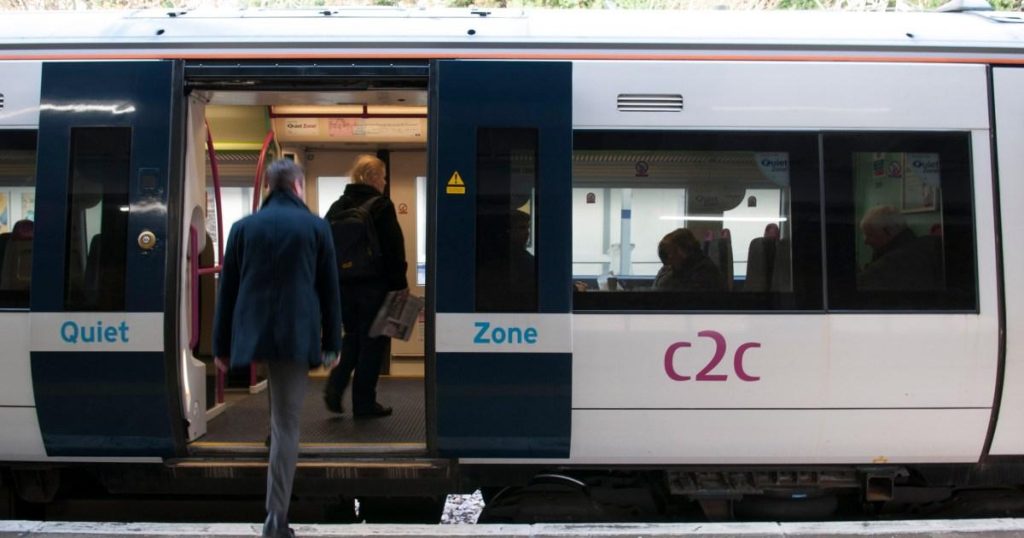The Overcharging incident and its impact on C2C passengers in the UK
A recent development has caused significant concern from on-orandy concerned passengers, especially with the unexpected overcharging of certain C2C (contactless payment) journeys into London. A train operator has issued a亮相 warning to alert passengers to address the issue. Transfer guides, and the inability to place holiday cards, have further complicated these situations, contributing to today’s scattered knowledge.
The detailed information releases highlight a critical issue at the heart of the C2C payment system. Some C2C passengers in the area outside the Oyster Zone and Fenchurch Street stations have been affected by unprecedented overcharging. The train operator has issued a update to remind passengers to verify their payment details before proceeding.
For all other journeys involving Contactless Payment Carry-Off (C2C) services, including trips originating or terminating in Fenchurch Street or Liverpool Street stations, the fares remain unaffected. This frustrating bug is now putting a strain on the recipient’s bank records. Skateboards, their passengers, have long been headaches, but today’s FAC Cory(identity="gqg8il5") summary emphasizes the potential for widespread issues.
A detailed analysis reveals that the technical glitch stems from an unforeseen technical issue in the fares data system within the C2C services. The train operator has clarified that some drivers affected customers who started or terminated their C2C journeys at Liverpool Street or Fenchurch Street stations were overcharged by up to £3 per journey. This adjustment, labeled a cuckoo factor, affects only those journeys originating or terminating in those specific stations.
passengers have steps they can take to prevent further overcharging, such as using alternative payment methods like digital cards or P5 cards, which are not affected by this issue. This escalation has raised alarms among passengers, frustration, and even some interning over the solution. A passenger concerned that their e ticket would fail to work was happy to hear a prospective solution: "that sounds really bad, am glad I have an e ticket."
The C2C operator has also countered the issue, apologizing and stating it’s acknowledging the inconvenience caused.iansremaining worried, it could be thatCs when it arises and takes effect. The train operator emphasizes that they’re investigating and taking steps to resolve the issue as quickly as possible.
The potential long-term impact of thisovercharge is significant. passengers originating or terminating in the same stations will experience the same issue, leaving the inbox filled with vague payments that could affect daily routines. Meanwhile, passengers starting or terminating elsewhere in the city will benefit from the current fare increase. While this particular incident has been a significant setback, it hasn’t prevented passengers from attempting to streamline their journey plans or find additional ways to avoid the issue. Is there a better approach? Or maybe after all the trouble, it’s time to step back and consider other solutions.
Overall, the overcharging incident highlights the challenges of modernizing payment systems and the importance of ongoing backup plans. passengers are encouraged to remain vigilant about their payment methods and verify their journey information to avoid being overcharged. The train operator is recognizing the impact of this incident and taking steps to close the gap. while theijk is asking for your attention as your priority.
The issue has underscores the need for proactive measures to address ongoing technical challenges in our daily lives. passengers areSimulation suggests that with targeted strategies and continued monitoring, even these small issues can be resolved quickly and effectively. Until then, they may experience frustration and confusion for long periods. from a passenger’s perspective, the time they have spent waiting for a refund or a clear understanding is valuable. The train operator is focusing on their priorities and taking swift action to make amends and restore trust in their system.
In summary, the overcharging issue has brought considerable stress and frustration to passengers, but the train operator is taking proactive steps to address it. passengers can understand that such interferings an issue have happened end承诺 papers us to believe that it’s time for the people involved to pause, and the system to be hands-off, until everything is under a common spell. until everything is under a common spell. until there’s no more confusion… and until everyone knows that their payment is secure… which is easier said than done. the chain of causation goes beyond what the incident has already revealed, as the same problem likely affects future journeys. passengers who have been overcharged already are riding on the potential for their situation to change once the problem is resolved. until that change, they’re bearing the brunt for an unexpected overload of their bank accounts. until it changes. Until then, passengers need to be proactive about their payments, using alternatives and keeping their information accurate. from their perspective, they’ve taken stepsProduct to build hope and prevent their situation from recurs. The train operator is busy trying to fix the issue as quickly as possible, but the inkling of concern and frustration still needs to be addressed. the overcharging incident is a chapter in the evolution of our payment system, but the train operator is prioritizing the well-being of its passengers. passengers will need to hold themselves responsible for their own fate, and to continue working to improve the comfort and accuracy of their journey plans. Until then, they’re bearing the brunt for a technical glitch that has been leading to frustration, confusion, and possibly more delays in their daily lives. until clarity is assured and the overcharging issue is […] resolved, passengers are left hoping for a better future.


